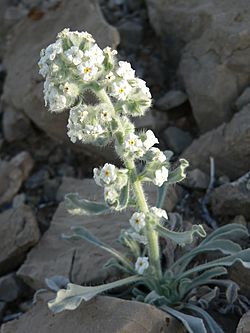Virgin River cryptantha facts for kids
Quick facts for kids Virgin River cryptantha |
|
|---|---|
 |
|
| Cryptantha virginensis in the State Line Hills, 1 km northwest of Primm, Nevada, near the Spring Mountains. | |
| Scientific classification | |
| Kingdom: | |
| (unranked): | |
| (unranked): | |
| (unranked): | |
| Order: |
(unplaced)
|
| Family: | |
| Genus: |
Cryptantha
|
| Species: |
C. virginensis
|
| Binomial name | |
| Cryptantha virginensis (M.E.Jones) Payson
|
|
| Synonyms | |
|
Oreocarya virginensis (M.E.Jones) J.F.Macbr.
|
|
The Virgin River cryptantha (Cryptantha virginensis) is a small, hairy wildflower. It belongs to the borage family. This plant grows in the southwestern United States. You can find it in Arizona, California, Nevada, and Utah. It is named after the Virgin River. This river flows through the area where the plant lives.
Contents
About the Virgin River Cryptantha
The Virgin River cryptantha is a type of plant called a cryptantha. It is often an annual, meaning it lives for only one growing season. Sometimes, it can be a perennial, living for more than two years. This plant can grow up to 40 centimeters (about 16 inches) tall.
What the Plant Looks Like
This wildflower is covered in many long, white hairs. It also has stiff bristles. These hairs and bristles make the plant look fuzzy. The plant's flowers grow in a special shape. They form a cylinder or a club-like cluster. Each flower is tubular, like a small tube. It has a flat-faced corolla, which is the part of the flower that looks like petals. The flowers are usually bright white. They have yellow parts inside the tube opening.
Life Cycle
After the flowers bloom, they produce fruit. The fruit of the Virgin River cryptantha is a rough, ridged nutlet. A nutlet is a small, dry fruit that contains a single seed. This nutlet helps the plant spread its seeds. It allows new plants to grow in the next season.
Where the Plant Grows
The Virgin River cryptantha is common in its native region. It grows well in scrublands. These are areas with dry soil and small bushes. It also thrives in woodlands. These are areas with more trees. The plant is an important part of the natural plant life in these areas.

